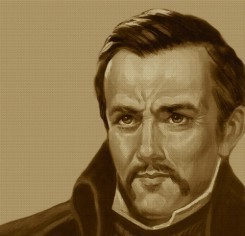People from across Scotland will converge a Moray town next month to pay tribute to Scotland’s first saint in more than 700 years in the town of his birth.
Keith-born St John Ogilvie was martyred in 1615 and will be celebrated with a family fun day to commemorate the 400th anniversary of his death.
The celebration, to be held at Keith Football Club’s Kynoch Park on Saturday, July 4, will kick off at noon and is expected to attract coach-loads of visitors from as far afield as Paisley and Motherwell.
After refusing to denounce his Catholic faith, St John Ogilvie was tortured by being kept awake for eight days and nine nights, before he was hanged at Glasgow Cross on March 10, 1615.
July’s commemorations come just four months after a mass at St Andrew’s Cathedral in Glasgow paid tribute to the saint on the day of his death.
More than 30 stalls will be on offer and the entertainment will include singing from the Diocesan choir. Children will be able to enjoy a bouncy castle and fun events organised by the Dominican Sisters from Elgin. Mass will take place at 3pm.
Dr Glen Reynolds, of the Roman Catholic Diocese of Aberdeen charitable trust, said: “The day celebrates the story of a remarkable man from Keith, who has a privileged place in the history of the area and the Roman Catholic Church, particularly in Scotland and here in the north-east.
“John Ogilvie’s life was short, and yet his tale of bravery, courage, selflessness and devotion to his faith has lasted long after his death.”
St John Ogilvie – a Jesuit priestdeclared his loyalty to his king on countless occasions, but made clear he was dying “for religion alone”, adding: “For that I am prepared to give even a hundred lives”.
John Ogilvie was not born a Catholic, and he wasn’t admitted to the faith until he was 17-years-old. He was a priest for only five years and he was dead by the age of 36.
His trial — following torture, beatings, starvation and sleep deprivation — and his subsequent execution attracted great public attention throughout Europe and he was revered by his Jesuit order and throughout the church.
It was not until 1929 that he was beatified (made blessed) and, in 1976, he was canonised as Scotland’s first saint in more than 700 years.
